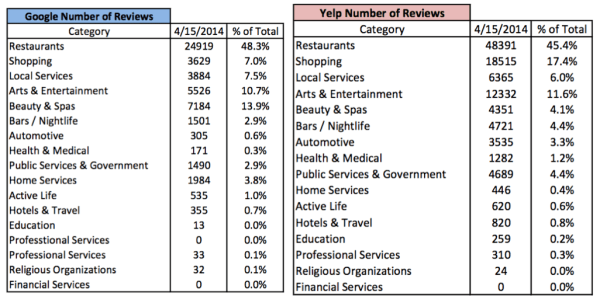Content Free: 25 Percent Of Google+ Reviews Are “Empty”
Investment firm Piper Jaffray has started tracking and comparing Google+ and Yelp reviews. For its inaugural report, the firm looked at a “snapshot of 950 places in 20 major cities” and compared review counts and depth across categories. The firm says it will continue to do so on a weekly basis going forward. Yelp holds […]

Investment firm Piper Jaffray has started tracking and comparing Google+ and Yelp reviews. For its inaugural report, the firm looked at a “snapshot of 950 places in 20 major cities” and compared review counts and depth across categories.
The firm says it will continue to do so on a weekly basis going forward.
Yelp holds a significant lead in coverage and review counts according to the report (embedded below). The main findings reveal some interesting things:
- Yelp has an average of 142 reviews per location; Google+ averages 69 reviews
- Out of 950 places examined in the report, Google had reviews for 750 of them
- Yelp reviews are longer (784 characters per review on average vs. an average of 161 characters for Google+ reviews)
- A full 25 percent of Google+ reviews “contained no text and only a [star] rating”
On this last point, one could question the validity of counting star ratings without any text for context or verification of intent. Yelp filters out reviews that it considers untrustworthy, but which may be legitimate. (The company has caught all kinds of hell for this practice.)
Sources: Yelp, Google, Piper Jaffray research
Search Influence CEO Will Scott just yesterday published a study of Google+ review counts and their click impact. His study concluded that Google+ “review inflation” — the inclusion of these no text “reviews” in review counts — had an impact on user behavior.
Higher Google+ review counts caused people to click on the Google “map pack” vs. organic results below. Reduction of Google+ review counts boosted organic results clicks by comparison.
Conspiracy theorists might argue that Google is including these more dubious stars-only “reviews” (25 percent of the total, according to Piper Jaffray) to keep users within the Google ecosystem and away from third-party organic results (e.g., Yelp). This is the type of claim that Google antitrust critics have been making for several years.
Given the Piper Jaffray report and Will Scott’s analysis, it will be interesting to see whether Google makes any policy change regarding its ratings-only “reviews” in the future. This is the type of thin-content that Google might be inclined to “demote” if appearing on a third-party site.
Yelp reports Q1 earnings later today.
Contributing authors are invited to create content for Search Engine Land and are chosen for their expertise and contribution to the search community. Our contributors work under the oversight of the editorial staff and contributions are checked for quality and relevance to our readers. The opinions they express are their own.
Related stories
New on Search Engine Land
